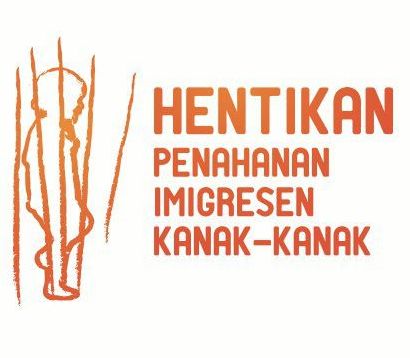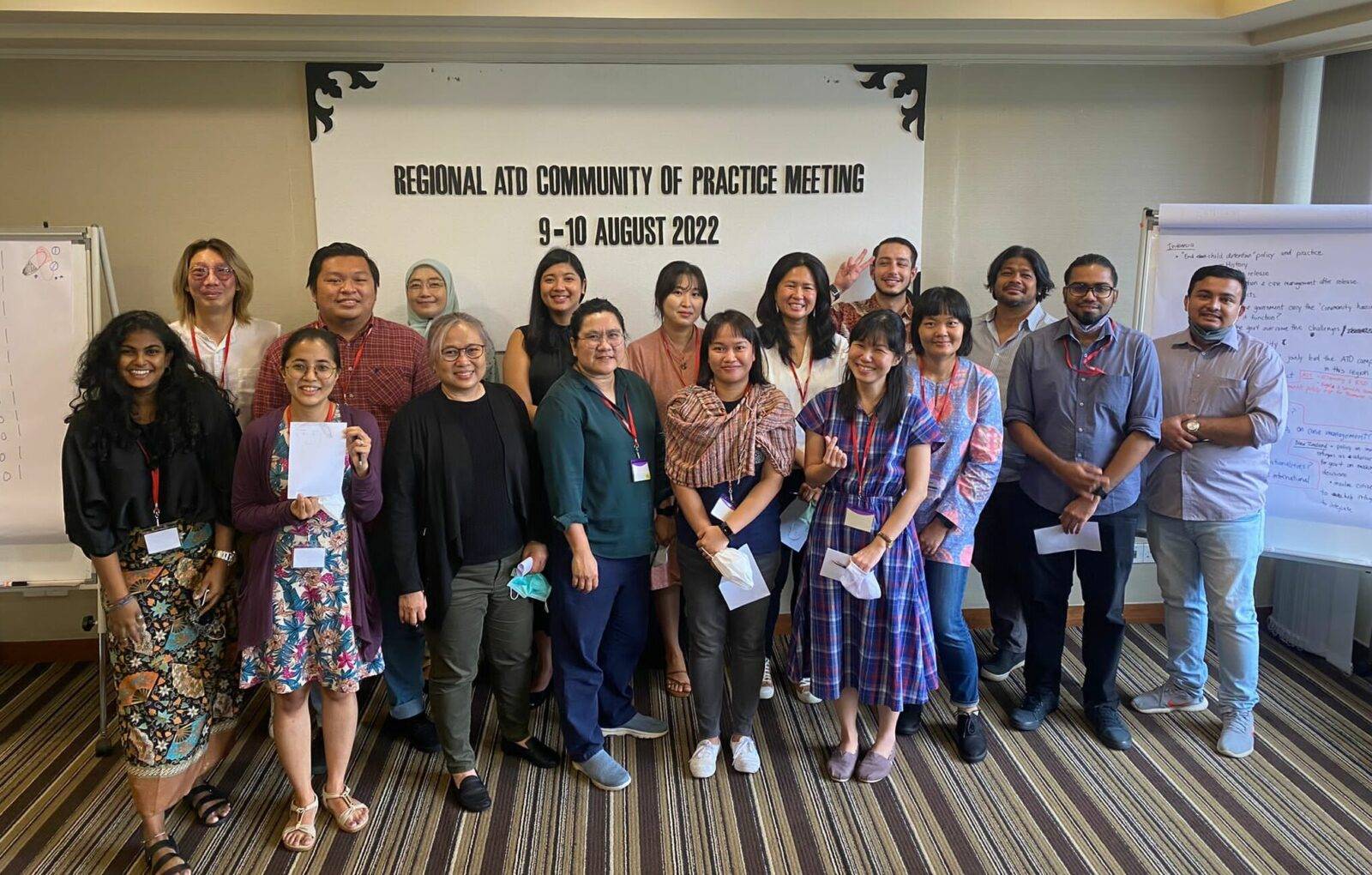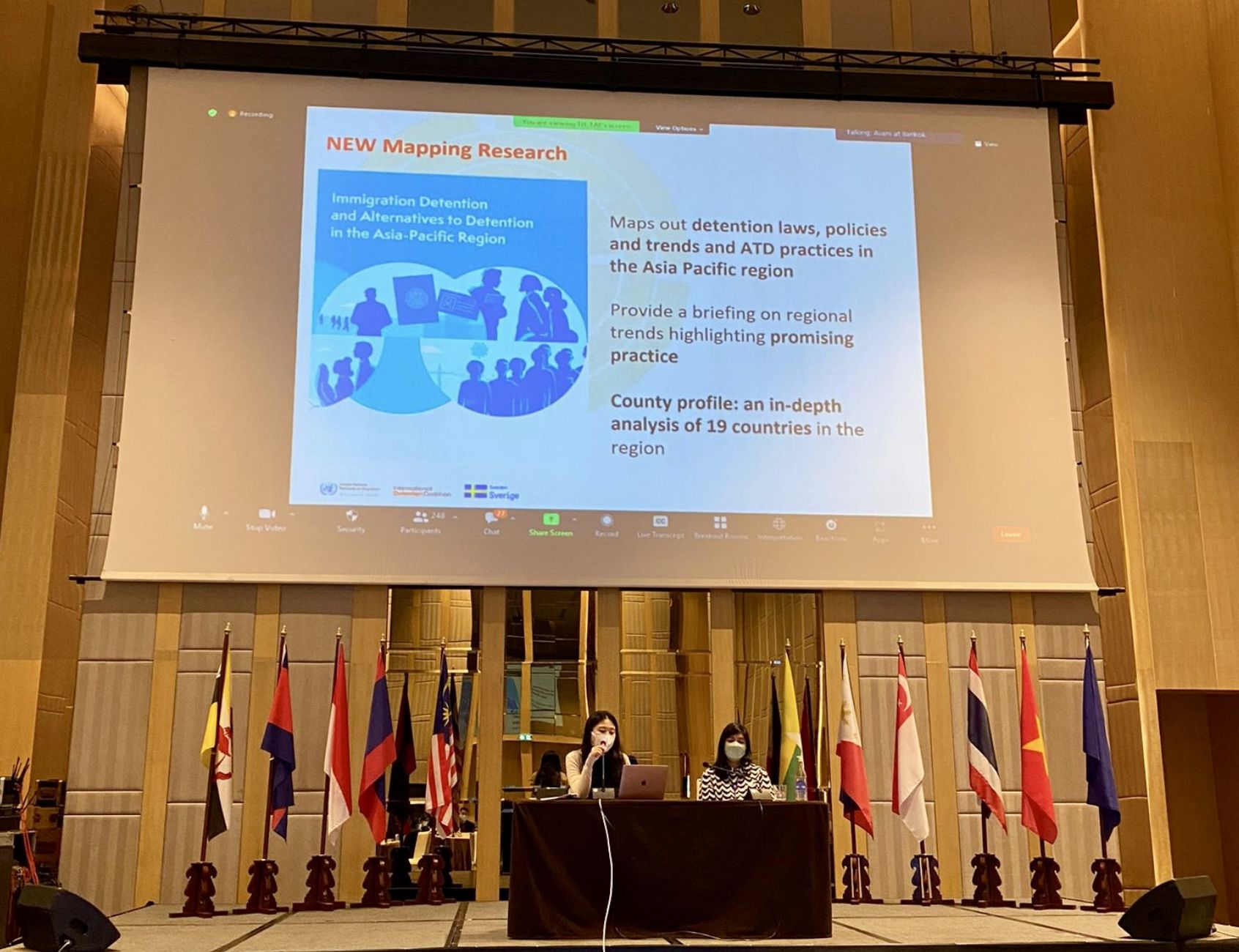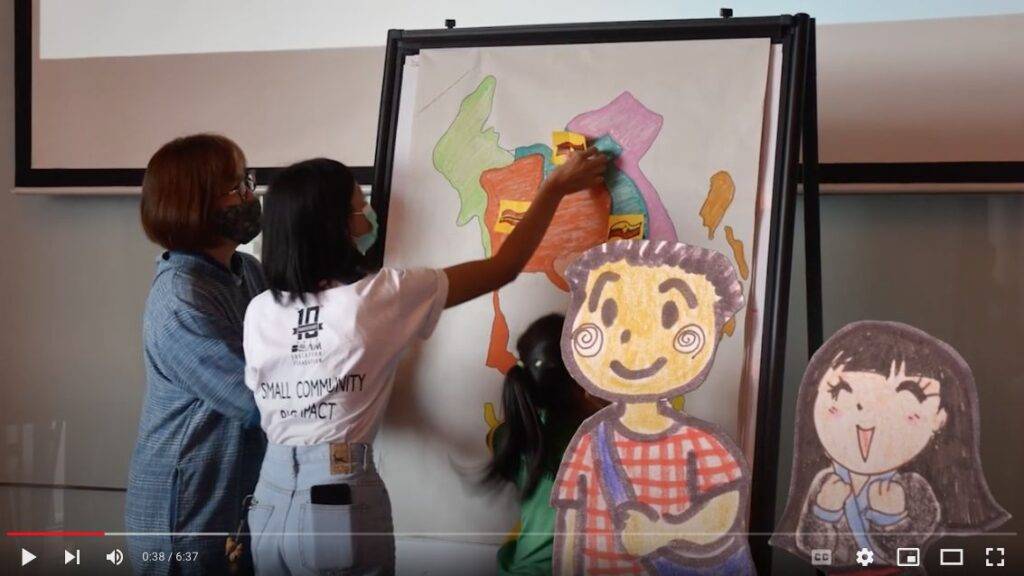Coming Together for the Asia Pacific Regional Community-of-Practice Meeting
On the 9th and 10th of August 2022, IDC hosted an in-person, Asia Pacific Regional Community of Practice (COP) meeting in Kuala Lumpur. A total of 13 participants, representatives of CSOs working on ATD implementation and advocacy from Malaysia, Indonesia and Thailand joined the meeting - the first one in-person since the pandemic.
The meeting set out with several objectives:
- to provide an opportunity for peer learning and exchange of the key challenges and lessons learnt for implementing and advocating for ATD, particularly for children and vulnerable groups;
- to increase capacity and ability of participating members to strategise and advocate for ATD by engaging with governments, building stronger alliances across different sectors and working with refugee leaders and communities affected by immigration detention.
- to facilitate opportunities for further cross-country/bilateral collaborations between members
- to envision and lay the foundations for a sustainable, regional ATD platform among civil society members
In close conversation and collaboration with fellow refugee rights advocates, the COP participants launched into discussions on connecting national-regional-global advocacy, with the Malaysian and Indonesian participants both indicating interest in exploring engagement at an ASEAN level, with Malaysian participants also keen to kick start engagement with diplomatic missions, embassies, and the National Human Rights Commission. On the other hand, Thai participants were interested in elevating issues of women, children, and gender-diverse people who are affected by migration to improve their access to gender-responsive support services via the upcoming CEDAW shadow reporting.
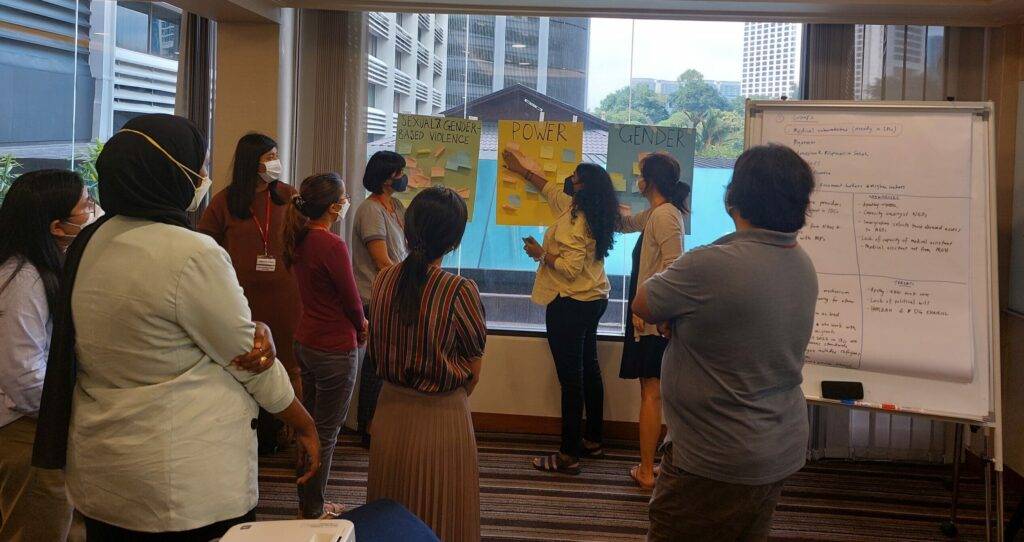
There was also substantial interest and discussion around leadership and engagement of persons with lived experience of immigration detention, with the participants recognising the need to have systemic shifts to ensure that people with lived experience are shaping and leading the work and advocacy at multiple different levels. In this vein, we discussed current initiatives in Thailand and Malaysia, and opened the floor for an honest sharing session and discussion around the relationships between Civil Society Organisations (CSO) and lived experience leaders, in particular, encouraging being mindful of tokenising of refugee participation as compared to meaningful and mutually beneficial engagement.
The CSO participants also explored key topics they would like to explore further, at the upcoming Regional ATD Peer Learning Platform which will be joined by representatives from the governments of New Zealand and Australia, alongside the governments of Malaysia, Thailand, and Indonesia. Topics of interest included advocating for the rights and release of people with medical vulnerabilities, benefits of ATD for governments, mechanisms to facilitate access to education and healthcare, and inclusion of lived experience leaders in both CSO spaces as well as government spaces.
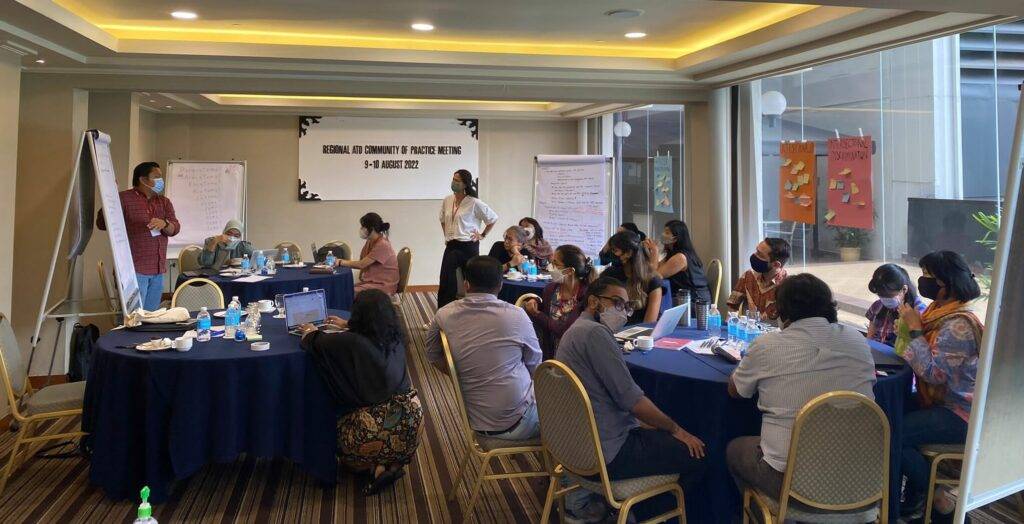
As the group moves forth, we mutually agreed to coordinate our advocacy efforts and explore regional collaborations through joint statements, cross-country campaigns, and advocacy using regional mechanisms. After all these years, coming together again in-person to share our experiences, strengthen networks, and collaboratively develop strategies was reinvigorating for both the participating CSO members as well as the IDC team members involved. Learning from each other - about our achievements, and challenges; and planning towards future regional cooperation is a reminder that systemic change can be made reality through sustained, coordinated, multilateral collaboration.
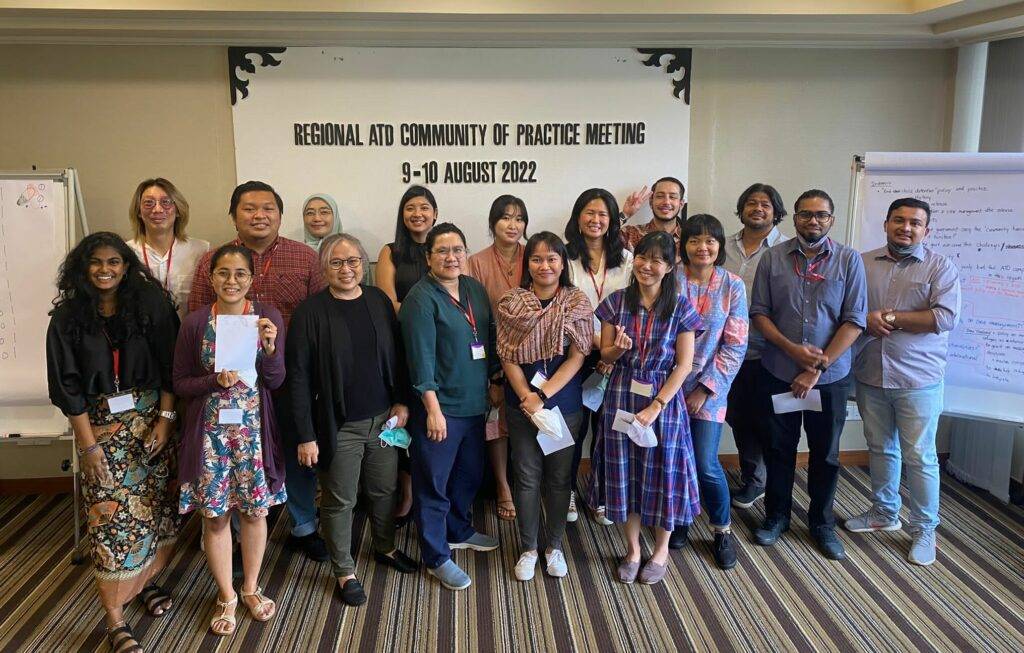
Written by Hannah Jambunathan IDC Community and Engagement Organiser - Malaysia
IDC Asia Pacific Programme Spring Event Round-Up
In May, during the International Migration Review Forum (IMRF) IDC was excited to see Thailand’s global leadership, and welcomed Thailand’s pledge to improve the lives of people who migrate. Alongside progressing birth registration for migrant children and universal health coverage, Thailand pledged to effectively implement ATD for migrant children and work towards ending child immigration detention. Thailand also pledged to engage the public towards ending discrimination and stigmatisation of migrant communities. IDC will continue to work in collaboration with Thailand to achieve these pledges.
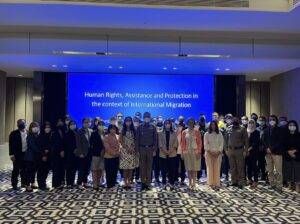
Further in May, IDC’s Asia Pacific Programme Officer, Min Jee Yamada Park, presented at the ASEAN Workshop on Women and Children in the Context of Migration, and discussed key findings from IDC's latest research report which maps the use of immigration detention and alternatives to immigration detention (ATD) in 19 countries across the Asia-Pacific region. You can find the new report here.
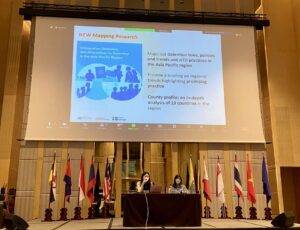
Mic Chawaratt, IDC’s Southeast Asia Programme Manager also took the stage at the ASEAN Workshop on Women & Children in the Context of Migration to reflect on the IMRF and the momentum it sparked for migration issues at regional and national levels. Mic highlighted that ending child detention was a key priority issue that could help GCM vision become a reality, and that the ASEAN Declaration of the Rights of Children in the Context of Migration and its Regional Plan of Action reinforce the GCM agenda. Mic urged ASEAN Member States to use ATD as a vehicle to end child detention in the region and further suggested how ASEAN governments and stakeholders can engage ASEAN mechanisms as well as the GCM to fulfil the rights of migrant children.
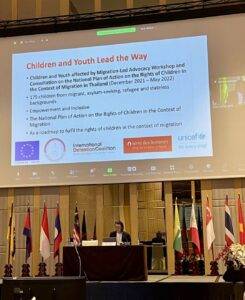
Lastly, Mic also represented IDC at a panel on 'Human Rights, Assistance and Protection in the context of International Migration,' which was co-organised by IOM Thailand, OHCHR Asia-Pacific Office, Thailand’s Immigration Bureau, the Canadian Embassy to Thailand, and the US Embassy to Thailand. Mic highlighted lessons from the implementation of the ATD-MOU and community-based case management in Thailand, and shared recommendations for the Thai government to strengthen laws, policies and processes to end immigration detention of children and their families. You can find the new report here.
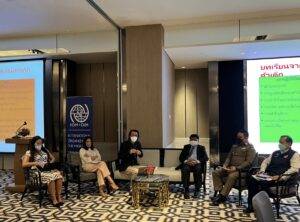
IDC also proudly signed the joint statement coordinated by the Asia Pacific Refugee Rights Network (APRRN) on World Refugee Day: Civil Society Calls for Urgent Measures to Protect Uyghurs at Risk of Refoulement.
Strengthening Partnerships to Implement Effective ATD in Thailand
On 9 June 2022, the Department of Children and Youth (DCY) of the Government of Thailand signed a memorandum of understanding with HOST International Thailand Foundation (HOST) to establish a formal partnership and collaboration to implement the Memorandum of Understanding on the Determination of Measures and Approaches Alternative to Detention of Children in Immigration Detention Centres (MOU-ATD), signed by the Thai government in 2019.
Over the past few years, DCY and HOST, as well as IDC and other civil society stakeholders, worked in collaboration to leverage Thailand’s commitment to end the immigration detention of children. This involved collaborating to reduce the number of children in immigration detention, while promoting the use of community-based Case Management and alternatives to detention (ATD) for children and their families. The DCY and HOST partnership MOU signed in June this year stipulates clear and coordinated objectives for both parties to implement the MOU-ATD in line with the United Nations Convention on the Rights of the Child (UN-CRC) and the Regional Plan of Action on Implementing the ASEAN Declaration on the Rights of Children in the Context of Migration. The partnership MOU also includes coordination on activities to strengthen the capacity of child protection officers and the child protection system to effectively protect children and their families in the context of Migration. As part of this initiative, HOST will serve a critical role as an equal partner with DCY, and will assign staff to coordinate with DCY to provide assistance to children and their families released from immigration detention, as well as coordinate with Government agencies, international organisations and civil society to ensure holistic support services. HOST can also advise DCY on child protection issues, and regularly organise training on child protection for DCY staff and other key stakeholders.
This partnership MOU is the first of its kind, and is the result of collective efforts by the Thai government and Thai civil society to advance a whole-of-society approach towards ensuring the best interests of the child in Thailand.
IDC is a key partner of DCY and HOST in implementing the MOU-ATD in Thailand. Most recently, IDC and HOST worked together on a joint project to strengthen community-based ATD throughout 2021-2022. IDC would like to congratulate both parties on this new partnership MOU, which represents a great outcome of positive and effective government and civil society collaboration. IDC believes that moving forward this partnership MOU will serve as a key tool for Thailand to achieve its pledge stated at the International Migration Review Forum in May 2022 - that Thailand will effectively implement ATD measures for children in the context of migration, as well as commit to end child immigration detention.

Written by Mic Chawaratt IDC Southeast Asia Programme Manager
Summary Document: Children & Youth Workshop Consultations in Thailand
From December 2021 to March 2022, the Thai government Department of Children and Youth – Ministry of Social Development and Human Security (DCY), International Detention Coalition, Terre des Hommes Germany (TDHs) and UNICEF Thailand, with support of the European Union, co-organised the Children and Youth affected by Migration-Led Advocacy Workshop and Consultation on the National Plan of Action on the Rights of Children in the Context of Migration in Thailand.
These partners developed a summary document describing their work with children and youth during this time. This includes a detailed overview of the problems and challenges identified by the children and youth, the proposals they presented to government stakeholders and their responses, as well as an Appendix with a list of coordinated forums, the Statement of Children and Youth Affected by Migration in Thailand, and the child-friendly activities implemented throughout this initiative, with further child-friendly materials available here.
For further insights and reflections, please also view the corresponding blog: 5 Lessons We Learned From Children & Youth Affected by Migration in Thailand.

Summary Document English (16 pages) DOWNLOAD
 Summary Document Thai (18 pages) DOWNLOAD
Summary Document Thai (18 pages) DOWNLOAD
5 Lessons We Learned from Children & Youth Affected by Migration in Thailand

Today, millions of children and youth migrate and cross international borders for many complex reasons, with some forced to leave their homes to escape conflict, violence, poverty, or environmental degradation, and to seek safety, peace and stability. Along the way, they are at risk of abuse, exploitation, and violence. Many travel with family members, but an increasing number of children are travelling alone, putting them at greater risk of harm and exposure to these dangers. The impact of these experiences is devastating and long-lasting.
In response, the international community has made a number of commitments to protect and uphold the rights of children. For example, the Convention on the Rights of the Child (CRC) adopted in 1989, and the Global Compact for Safe, Orderly and Regular Migration (GCM) and the Global Compact on Refugees (GRC) which were both adopted in 2018 and have been implemented since. In Asia, at the sub-regional level, the ASEAN Declaration on the Rights of Children in the Context of Migration (ASEAN-CCM) and its Regional Plan of Action (RPA) were adopted and began implementation in 2019 and 2021, respectively. Additionally, at the regional level, children and youth affected by migration shared their views at the Asia-Pacific Regional Review of Implementation of the GCM in March 2021, as well as at the virtual launch of the ASEAN RPA on the Rights of Children in the Context of Migration in January 2022.
As the International Migration Review Forum (IMRF) takes place this May, and beyond, more leadership and agency need to be given to people with lived experience, especially children and youth, to provide feedback and to influence laws, policies, and practices that directly impact their own lives. This inclusion will lead to better and more informed policy development and implementation by States and relevant stakeholders at all levels, with the aim to ensure that the human rights of displaced people and migrant communities, especially children, are always promoted, protected and fulfilled.

Children and Youth Lead the Way
From December 2021 to March 2022, the Thai government Department of Children and Youth - Ministry of Social Development and Human Security (DCY), International Detention Coalition, Terre des Hommes Germany (TDHs) and UNICEF Thailand, with support of the European Union, co-organised the Children and Youth affected by Migration-Led Advocacy Workshop and Consultation on the National Plan of Action on the Rights of Children in the Context of Migration in Thailand. Here are five lessons we learned from this important initiative:
1. Meaningful child participation is critical to advocacy
Meaningful “child participation” refers to ensuring that all children enjoy the right to be heard, express their opinions, and influence decisions that impact them directly. This practice has proven to have a positive impact on the development of children and youth, through enabling them to acquire skills, build on their strengths and competencies, and increase their confidence and self-esteem. Child participation also advances the capacities of children and youth to promote leadership, civic engagement, tolerance, and respect for others. By applying the child participation principle throughout the capacity building process of this initiative, we strengthened the personal and collective empowerment of 175 children and youth affected by migration across 7 provinces in Thailand, including those from migrant, asylum seeking, refugee, and statelessness backgrounds. Through this leadership programme, which was designed using various partner materials, such as TDHs’s Manual on Children’s Participation and IDC’s Community Leadership Curriculum, these young people learned how to analyse relationships of power and develop campaigns to target policy makers and implementers. They also learned about the fundamentals of child rights, and global and regional policy mechanisms.

This group was diverse in background, age, gender, legal status, language, etc., which gave them the opportunity to learn from each other, and share their experiences, challenges and ideas for solutions. Child-centred and inclusive approaches were critical to this process, as it allowed for effective interaction between children and youth, facilitators, teachers, parents and others working on this initiative. As a result, the children and youth were more engaged and confident in amplifying their voices to adults in decision making. We also developed child-friendly materials on the GCM, GCR, ASEAN-CCM and RPA to help children and youth understand these instruments in a simple and clear way so that they were better able to strategically share their opinions with the Thai government and other stakeholders. We also provided capacity building for local organisations to facilitate meaningful child participation using these materials at the grassroots level on an ongoing basis.
While there has been progress through this initiative, meaningful child participation in policy and decision making continues to be limited. All stakeholders are needed to address this issue and ensure widespread inclusion of the leadership of children and youth affected by migration in advocacy and policy making.

2. Lived experience leadership has power and impact
In the migration context, leaders with lived experience are those who have direct, personal experience of the migration system, policies and issues. Based on their lived experience and their leadership, these leaders are best placed to inform, shape, and guide social purpose efforts aimed to benefit communities with shared experiences to their own.
In light of the Thai government’s National Plan of Action on the Rights of Children in the Context of Migration, which facilitates Thailand’s commitments in both Global Compacts, ASEAN-CCM, and its RPA, we invited migrant children and youth leaders from our capacity building process to share their experiences and solutions directly to policy-makers. In this forum, attended by Thailand’s Representative to ASEAN Commission on the Promotion and Protection of the Rights of Women and Children(ACWC), representatives from the Ministries of Interior, Foreign Affairs, Social Development and Human Security, as well as international organisations and NGOs, the children and youth leaders raised their concerns and presented their statement and recommendations for addressing challenges they face, such as legal status, access to healthcare, access to education, and immigration detention. Listening to these young people and hearing their stories directly was incomparable to reading reports and data, and the representatives present were moved, and felt inspired by the children and youth to take action. The policy-makers and key stakeholders committed to ensuring that the leadership and voices of children and youth are included in the development of the National Plan of Action on the Rights of Children in the Context of Migration.
Through this process, it was clear that centering the leadership of children and youth has power and impact in constructive engagement with policy-makers. We also learned that children and youth are key actors in creating systemic social change when provided the opportunity to do so.

3. The whole-of-society approach increases collective capacity to make change
The whole-of-society approach is defined in the GCM and GCR as broad multi-stakeholder partnerships, including governments, UN agencies, civil society, migrant communities, and other actors, that holistically address migration and refugee issues in all of their dimensions. Both Global Compacts also encourage governments to work with relevant stakeholders to make national plans to actualise the agreements made in the Global Compacts through concrete action. In line with the GCM, GCR, ASEAN-CCM, and its RPA, we applied the whole-of-society approach by partnering with government agencies, UN agencies, international and local Non-Government Organisations (NGOs) to advance a united goal to promote, protect and fulfil the rights of migrant children in Thailand. We did this together through the development of the National Plan of Action on the Rights of Children in the Context of Migration.

Most importantly, we involved children and youth affected by migration as key stakeholders and partners in the design of this National Plan of Action through meaningful and constructive engagement and capacity support. We ensured that their voices and views were heard and were part of developing solutions, which we believe helps all stakeholders better respond to needs on the ground. This whole-of-society approach allowed all stakeholders involved to understand the mandates, capacities and strengths of their counterparts, and create ways to work together in their various roles toward developing a more humane, just and child-centred migration policy. This collaborative approach is beneficial, as it increases our collective capacity as a group to challenge complex issues, which cannot be addressed alone or in silos. Most importantly, we learned that in broad multi-stakeholder partnerships, all actors must approach collaboration with respect, trust and with an open-mind.

4. Political will is necessary to make systems change
Thailand is a GCM Champion Country, and leads the implementation of Objective 13 of the GCM (alternatives to detention and ending child immigration detention) and Objective 15 (access to services for migrant communities; particularly access to healthcare). Thailand also plays the lead role in developing and implementing ASEAN-CCM and its RPA. These various global and regional commitments affirm the Thai government’s political will to promote the rights of children affected by migration in the country. The commitments also create a more inclusive and enabling environment of change among relevant stakeholders, including civil society, migrant communities and UN agencies, who can more easily plan their advocacy in line with the governments’ agreements within these global and regional instruments.
Additionally, it is important that we learn from children and youth affected by migration and their leadership and advocacy in Thailand, and use our experience as an example of systems change where those most impacted are part of the change-making process from the beginning. There is much more for the government and relevant stakeholders to do from here on to ensure widespread replication of this process. For example, all stakeholders must agree to this new approach, and involve children and youth affected by migration throughout the development and implementation of policies that directly impact them.

5. Global-to-local advocacy must be driven by local solutions
The global-to-local concept is based on ideas of inclusion and interconnection between global and local levels. For example, the GCM, GCR, ASEAN-CCM, and its RPA are global and regional instruments and commitments that must be implemented at national, local and community levels. Through our process, we applied this concept by translating global and regional commitments into the local context by creating a roadmap for implementation alongside children and youth affected by migration - the National Plan of Action on the Rights of Children in the Context of Migration.
We identified this process as a good practice and an important local solution in Thailand, and believe that the lessons we learned can help others hoping to do the same in their countries, as local solutions in one country can be adapted, replicated and scaled in other settings. By sharing the lessons we’ve learned, we hope to help encourage others to also ensure that the voices and leadership of migrant children are heard in all parts of the world.
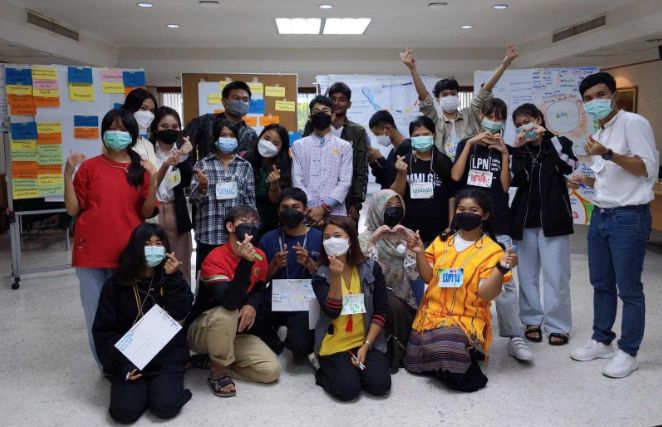
The partners involved in this initiative have developed a detailed Summary Document about their children and youth consultation and leadership process, please view this for more insights. For further information about the Children and Youth Affected by Migration-Led Advocacy initiative in Thailand, please contact:
- Department of Children and Youth Thailand: [email protected]
- International Detention Coalition: [email protected]
- Terre des Hommes Germany: [email protected]
- UNICEF Thailand: [email protected]
Written by Chawaratt Chawarangkul IDC Southeast Asia Programme Manager & Mia-lia Boua Kiernan IDC Communications & Engagement Coordinator
Statement of Children & Youth Affected by Migration in Thailand
In Thai Below
"When we children on the move come together, our voices will be meaningful. We will make a change, create protection and vigorously promote our rights."
The Rights of Children in the Context of Migration in Thailand
Bangkok, Thailand: 22 March 2022
The 17 of us, as representatives of the hundreds of children on the move, from all regions of Thailand, have gathered together to make a voice for children and youth affected by migration to be involved in creating positive change to make us child citizens of the world with equal rights to all children.
We would like to thank you for all the opportunities to bring us together and give us the opportunity to learn and share with our opinions towards the National Plan of Action to advance the ASEAN Declaration on the Rights of Children in the Context of Migration as well as bringing our voice to reflect our participation in the Global Compact on Safe, Orderly and Regular Migration (GCM) and the Global Compact on Refugees (GCR). We know that the adults working with us do not leave children like us behind, and put importance on children’s voices at the policy level in a meaningful way.
In the context of migration, we may face special challenges that need support. But as children we still have rights, dreams, and hopes, like all children. We would like to ask adults to help us remove any obstacles that might hinder the rights we deserve, and support whatever will make our dreams and hopes come true. We raise a voice for the right to enable us to have a good life like every child around the world.
We raise our voice for:
- Right to Legal Status We and many friends were born and live in Thailand. Having an ID card and having citizenship in Thailand will give our lives a clear purpose. If we have been given legal status, we will also be able to access child rights. It will become a licence for us to live, study, work and have a bright future.
- Access to Healthcare Three equal benefits and access to public health services.
- Pay attention – pay equal attention to medical treatment for patients regardless of their backgrounds and consider the psychological impacts.
- Visibility – visualise and optimise services for migrants, refugees, and stateless persons.
- Equitable treatment – include universal health coverage for all groups of children on the move.
- Access to Education Equal quality education and more education opportunities. Education must reach children on the move, like all children. Children on the move need quality education that is suitable for us, such as free education or support scholarships. We also need to be able to obtain education certification without restrictions to help open the door to our dreams and our futures.
- Right to Security & Freedom from Arbitrary Detention We do not want children on the move to be arrested and detained due to our immigration status. We do not want to be separated from our parents. We want to be cared for by our families without immigration detention in any circumstance. We should be able to go to school and live as a child and have the same rights as all children. We ask adults to solve this problem for a sustainable solution nationally and internationally.
In the end, we thank everyone for being open-minded, and for listening and hearing children and youth affected by migration. You have made our voices meaningful by bringing them to create positive change on many levels. For us and together with us, we want you to know how much this means to us. We will never stop dreaming, never stop hoping, never stop improving ourselves, and never stop pushing for positive change, and for the rights of all children.
คำแถลงของเด็กและเยาวชนที่ได้รับผลกระทบจากการโยกย้ายถิ่นฐานในประเทศไทย
“เมื่อพวกเราเด็กเคลื่อนย้ายรวมตัวกัน เสียงของพวกเราจะมีความหมายเราจะสร้างการเปลี่ยนแปลง สร้างการคุ้มครองป้องกัน และส่งเสริมสิทธิของพวกเราอย่างมีพลัง”
สิทธิเด็กในบริบทการโยกย้ายถิ่นฐานในประเทศไทย
กรุงเทพ, ประเทศไทย, 22 มีนาคม 2565
พวกเราทั้ง 17 คน ในฐานะตัวแทนเครือข่ายเด็กและเยาวชนที่ได้รับผลกระทบจากนโยบายที่เกี่ยวกับการโยกย้ายถิ่นฐานหลายร้อยคน จากทุกภูมิภาคของประเทศไทย ที่ได้รวมตัวกันเพื่อร่วมกันส่งเสียง ของเด็กและเยาวชนเคลื่อนย้าย หรือ เด็กในบริบทโยกย้ายถิ่นฐาน ให้ได้ เข้าไปมีส่วนในการสร้างการเปลี่ยนแปลงที่ดี ที่จะทำให้พวกเราในฐานะ “เด็ก” พลเมืองของโลก ได้รับสิทธิเช่นเดียวกันกับ “เด็ก” ทุกคน
พวกเราอยากขอบคุณทุกโอกาส ที่ทำให้พวกเราได้มาเจอกัน และเปิดโอกาสให้พวกเราได้รู้จักและ มีส่วนร่วมในการแสดงความคิดเห็น ทั้งต่อแผนปฏิบัติการระดับประเทศ เพื่อการขับเคลื่อนปฏิญญาอาเซียน ว่าด้วยสิทธิของเด็กในบริบทของการโยกย้ายถิ่นฐาน พร้อมทั้งยังพาเสียงของเด็กไปสะท้อนการมีส่วนร่วมในข้อตกลงระหว่างประเทศเพื่อการโยกย้ายถิ่นฐานที่ปลอดภัย เป็นระเบียบ และปกติ (GCM) และข้อตกลงระหว่างประเทศว่าด้วยผู้ลี้ภัย (GCR) ทำให้พวกเราทราบว่า ผู้ใหญ่ไม่ลืมเด็กอย่างพวกเรา ไม่ทิ้งพวกเราไว้ข้างหลัง และยังให้ความสำคัญต่อเสียงของเด็กอย่างมีความหมายในระดับนโยบายอีกด้วย
ในบริบทของการโยกย้ายถิ่นฐาน พวกเราอาจเผชิญหน้ากับความท้าทายเฉพาะที่ต้องได้รับการช่วยเหลือและสนับสนุน แต่ในความเป็น “เด็ก” พวกเรายังมีสิทธิ มีความฝัน ความหวัง เหมือนกับเด็กทุกคน ขอผู้ใหญ่ช่วยขจัดอุปสรรคที่จะขัดขวาง สิทธิที่พวกเราควรจะได้รับ สนับสนุนสิ่งที่จะทำให้ความฝัน ความหวังของพวกเราเป็นจริง พวกเราขอส่งเสียง เพื่อสิทธิที่จะทำให้ที่จะทำให้เรามีชีวิตความเป็นอยู่ที่ดี ในฐานะเด็กคนหนึ่ง เช่นเดียวกับ เด็ก ทั่วโลกอย่างเท่าเทียม
พวกเรา ขอส่งเสียงเพื่อ:
- สิทธิของการมีสถานะบุคคลที่ถูกต้องตามกฎหมาย
พวกเราและเพื่อนหลายคน เกิดและอยู่ในประเทศไทย การได้มีบัตรประชาชน มีสถานะบุคคลที่ถูกต้อง หรือเป็นพลเมืองของประเทศ จะทำให้ชีวิตของพวกเรามีจุดมุ่งหมายที่ชัดเจน หากพวกเราได้รับสถานะบุคคลที่ถูกต้องตามกฎหมาย พวกเราก็จะสามารถได้รับสิทธิต่าง ๆ และ เป็นเหมือนใบเบิกทางในการใช้ชีวิต การศึกษา การทำงาน และอนาคตที่ดีของพวกเราอีกด้วย
- สิทธิการรักษาพยาบาล
สิทธิประโยชน์และการเข้ารับบริการสาธารณสุขที่เท่าเทียม 3 ประการ
- ใส่ใจ – ใส่ใจในการรักษาพยาบาลแก่ผู้ป่วย อย่างเท่าเทียม และคำนึงถึงผลกระทบต่อจิตใจของพวกเรา
- มองเห็น – มองเห็นและปรับปรุงแก้ไขบริการให้เหมาะสมกับเด็กเคลื่อนย้ายทุกกลุ่ม
- ปฏิบัติอย่างเท่าเทียม – รวมไปถึงหลักประกันสุขภาพทั่วหน้าเท่าเทียม ในกลุ่มเด็กเคลื่อนย้ายทุกกลุ่ม
- สิทธิทางการศึกษา
การศึกษาที่มีคุณภาพ เท่าเทียม และอยากได้โอกาสในการศึกษาระดับสูงขึ้น การศึกษาต้องเข้าถึงเด็กเคลื่อนย้ายเหมือนเด็กทุกคน การศึกษาที่มีคุณภาพเหมาะกับความเป็นเด็กเคลื่อนย้าย การศึกษาที่ไม่มีค่าใช้จ่ายหรือสนับสนุนทุนการศึกษา และได้รับวุฒิการศึกษา โดยไม่มีข้อจำกัดใดใด เพื่อให้ประตูความฝัน และอนาคตของเราเปิดกว้าง
- สิทธิการไม่ถูกกัก หรือคุมขัง
พวกเราไม่อยากให้มีการจับและกักเด็ก และไม่อยากให้แยกเด็กกับพ่อแม่ เราต้องการให้เด็กได้รับ การดูแลโดยครอบครัว โดยไม่มีการกักหรือคุมขังเด็กไม่ว่ากรณีใดใด ควรให้พวกเรา ได้ไปโรงเรียน ได้ใช้ชีวิตเช่น “เด็ก” และมี “สิทธิ” เช่นเดียวกับเด็กทุกคน อีกทั้งเราขอให้มีการแก้ปัญหา ทั้งในระดับประเทศและระหว่างประเทศ เพื่อแสวงหาทางออกที่ยั่งยืนให้กับเด็กที่ได้รับผลกระทบจากนโยบายที่เกี่ยวกับการโยกย้ายถิ่นฐาน
ท้ายที่สุด พวกเราขอบคุณที่ทุกคน เปิดใจ รับฟัง ได้ยินเสียงของเด็กและเยาวชนเคลื่อนย้าย และทำให้เสียงของพวกเรามีความหมาย นำไปสู่การเปลี่ยนแปลงที่ดีในระดับต่างๆ เพื่อพวกเราและร่วมกับพวกเรา พวกเราอยากให้ทุกท่านทราบว่าสิ่งนี้มีความหมายต่อพวกเราเป็นอย่างมาก และพวกเราจะไม่หยุดฝัน ไม่หยุดหวัง และไม่หยุดพัฒนาตนเอง ไม่หยุดผลักดันการเปลี่ยนแปลงที่ดี สำหรับและเพื่อ “สิทธิ” ของ “เด็ก” ทุกคน
Child-Friendly Advocacy Materials: Thailand
From December 2021 to March 2022, the Thai government Department of Children and Youth - Ministry of Social Development and Human Security (DCY), International Detention Coalition, Terre des Hommes Germany (TDHs) and UNICEF Thailand, with support of the European Union, co-organised the Children and Youth affected by Migration-Led Advocacy Workshop and Consultation on the National Plan of Action on the Rights of Children in the Context of Migration in Thailand. See the video below of one of our workshops (in Thai with English subtitles):
Together, we developed child-friendly materials on the GCM, GCR, ASEAN-CCM and RPA to help children and youth understand these instruments in a simple and clear way so that they were better able to strategically share their opinions with the Thai government and other stakeholders. See those materials below, and feel free to utilise them for other youth leadership efforts as well:
English Materials on the Global Compact on Migration & Global Compact on Refugees DOWNLOAD
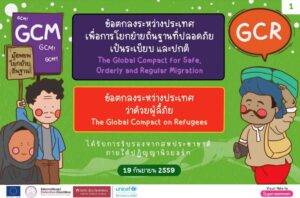 Thai Materials on the Global Compact on Migration & Global Compact on Refugees DOWNLOAD
Thai Materials on the Global Compact on Migration & Global Compact on Refugees DOWNLOAD
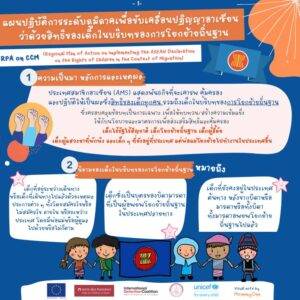 Thai Materials on ASEAN Declaration on the Rights of Children in the Context of Migration & its Regional Plan of Action DOWNLOAD
Thai Materials on ASEAN Declaration on the Rights of Children in the Context of Migration & its Regional Plan of Action DOWNLOAD
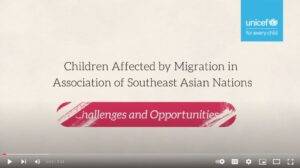 English Video on Introducing ASEAN Declaration on the Rights of Children in the Context of Migration VIEW
English Video on Introducing ASEAN Declaration on the Rights of Children in the Context of Migration VIEW
Joint Statement on Immigration Detention Policies & Practices in Malaysia
Published on Monday 2 May, 2022
International Human Rights Community Urges Malaysian Government to Rethink Immigration Detention Policies & Practices
In the early hours of 20th April, over 500 Rohingya refugees, including 97 women, 294 men, and 137 children, escaped from a detention centre in Sungai Bakap. It was later confirmed that 7 of those who fled were killed tragically in a traffic accident, including three young children. Over the following days, at least 467 people were re-detained, and there is a continuing effort by government authorities to find and arrest the remaining refugees who fled. As members of the international human rights community, we the undersigned are deeply concerned by this heartbreaking loss of life, and we urge the Malaysian government to conduct an immediate, thorough, and independent inquiry into the underlying circumstances and detention conditions which led to such severe levels of human desperation, and prompted an escape attempt by so many.
It is reported that a large number of Rohingya refugees are held indefinitely in immigration detention centres in Malaysia, without possibility of release. This has been compounded by the Malaysian government refusing UNHCR access to detention centres in order to conduct refugee status determination processes since August 2019. Home Minister Hamzah Zainudin has stated that refugees held at the Sungai Bakap detention centre have been detained for over two years and cannot be deported.
The deprivation of liberty of people and families seeking safety and asylum is a serious concern to us, and is a fundamental violation of human rights. The impact of detention on mental, physical, and emotional health has been extensively researched and consistently shows that people, especially those who have previously experienced traumatic events, face high levels of mental health challenges as a result of being detained. Further, ample evidence proves that the severity of anxiety, depression, and post-traumatic stress that a person experiences is closely linked to the length of time they have spent in immigration detention.
As of 26 April 2022, the Malaysian Immigration Director-General Datuk Seri Khairul Dzaimee Daud reported that there were 17, 634 migrants in immigration detention centres nationwide, including 1, 528 children. The Home Ministry has also further reported 208 recorded deaths in immigration detention between 2018 and February 15th 2022, citing Covid-19, septic shock, tuberculosis, severe pneumonia, organ failure, lung infection, heart complications, dengue, diabetes, and breathing difficulties, among others.
We strongly urge the Government of Malaysia to:
- Carry out a comprehensive review of the current policies and practices of immigration detention centres in Malaysia to ensure they are in line with international legal standards
- Ensure full transparency of the investigation and review, and make the process and results available and accessible to the public
- Proceed with immediate implementation of the ATD pilot officially launched in February 2022, and ensure Rohingya children are included within the scope of the pilot
- Simultaneously, take immediate steps to enact legal and policy changes to ensure that children are no longer detained for migration-related reasons, given that only 5 children are to be released at any time under the ATD Pilot
- Follow through on the pledges made to uphold human rights, in order to secure their seat on the United Nations Human Rights Council, for example, “to implement policies and legislations that promote and protect the rights of the most vulnerable communities,” which indisputably include refugees, people seeking asylum and stateless persons, especially women and children
- Immediately release all persons registered with UNHCR from immigration detention and grant UNHCR access to all immigration detention centres to continue registration of persons of concern
- Grant access to Doctors Without Borders Malaysia, and other NGOs to immigration detention centres to ensure detainees have access to medical treatment and support services
Malaysia continually lags behind its closest neighbours in ASEAN, specifically Thailand and Indonesia, who have released hundreds of children from immigration detention into community-based care since 2018. Further, in Indonesia, the local government in Aceh has set up a task force to manage emergency response. These processes link refugee communities to support from IOM, UNHCR, Geutanyoe Foundation, JRS Indonesia, and other organisations, until the national government advises which cities they will be transferred to for sustainable and ongoing accommodation and support.
We call upon the Government of Malaysia to respond to this human tragedy with compassionate leadership and integrity, and commit to protecting the rights of refugees and people seeking asylum in Malaysia, as committed to in the UN Convention on the Rights of the Child (CRC), the UN Convention on the Elimination of All Forms of Discrimination Against Women (CEDAW), and the ASEAN Declaration on the Rights of Children in the Context of Migration. The Government of Malaysia must reconsider its current policies and systems of immigration detention, which are arbitrary, harmful, costly and ineffective. Instead, they should develop and implement non-custodial alternatives to detention, particularly for people in vulnerable situations, such as children, ethnic and religious minorities, women, gender-diverse and LGBTI+ people.
It is time for Malaysia to step up to its international commitments, and we stand prepared to support the Government and other civil society organisations in developing systems and frameworks for alternatives to detention, and ensuring that nothing like this ever happens again.
Signed,
International Detention Coalition
Asia Pacific Refugee Rights Network
ASEAN Parliamentarian on Human Rights
Asian Forum for Human Rights and Development (Forum-Asia)
It’s Been 3 Years Since the Signing of the ATD-MOU in Thailand: Where Are We Now?
On 21 January 2019, representatives of 7 Thai Government agencies signed the Memorandum of Understanding on the Determination of Measures and Approaches Alternatives to Detention of Children in Immigration Detention Centres (ATD-MOU), as well as Standard Operating Procedures (SOPs) to implement the ATD-MOU starting in September 2020. The ATD-MOU was a concrete outcome of a pledge made by Prime Minister Prayut Chan-o-cha during the 2016 Leaders’ Summit on Refugees at the United Nations in New York. At the summit, he publicly pledged to end the immigration detention of refugee and asylum seeker children in Thailand.
Ever since the ATD-MOU was signed 3 years ago, IDC and HOST International have worked in partnership to collate and strengthen the evidence-base that can be used to increase practical understanding of community-based, rights-based, and gender-responsive ATD within the Thai urban refugee context. IDC and HOST have also been working together, and with various local partners, to strengthen ATD policy and practice in Thailand during this time.
To mark the 3rd anniversary of the ATD-MOU, IDC, HOST International and the Embassy of Canada to Thailand organised an event: “Strengthening Community-based ATD in Thailand: Lessons Learned From the Past 3 Years.” This event was funded by the Canada Fund for Local Initiatives (CFLI) and was held at the Novotel Sukhumvit Bangkok on 28 February 2022.
Over 60 people attended from a diverse group of stakeholders, including government agencies, civil society organisations, UN agencies, and diplomatic missions. Attendees came together to share and discuss the growing evidence-base, as well as critical pathways to shift focus from enforcement-focused models of ATD, towards ATD that is centred on community-based protection and care for all children and their families. The event began with opening remarks by Her Excellency. Dr. Sarah Taylor, the Ambassador of the Embassy of Canada to Thailand. She called on everyone to consider the crisis in Ukraine, and the stark reminder it gives us all that refugees and people seeking asylum flee their countries by no fault of their own, and security risk must be carefully assessed, not assumed. Dr. Taylor affirmed that the detention of people seeking asylum must only be used as an absolute last resort, and the detention of children is never justified.

These important remarks were followed by Laddawan Tantivithayapitak, President of HOST International Foundation Thailand, who emphasised HOST International’s mission to make life better for people on the move in Thailand by fostering humanity, hope, and dignity for all. Tantivithayapitak reflected on the partnership between HOST International and the Department of Children and Youth (DCY), as well as other key stakeholders who have supported children and their families being released from immigration detention since 2018, through a community-based Case Management programme.

Yuhanee Jekha, Regional Programme Manager at HOST International, then presented the independent evaluation report of HOST’s community-based Case Management programme conducted in 2021. This report highlighted the programme’s successes, lessons learned, and recommendations for specific interventions to bring more humanity and dignity to the urban refugee experience in Thailand. For example, following release from detention many children and their families found it very difficult to navigate complex legal systems, to meet basic daily needs, to access and pay for health care, manage finances, and participate in education. To address these issues, community-based Case Management in urban areas has proven to work extremely well and has excellent potential to grow to scale. In Thailand, this approach is cost-effective, supports compliance with immigration requirements, and leads to improved well-being by providing holistic and tailored support. This approach also requires strong partnership, the ongoing involvement of local communities, and long-term investment to support strengthened migration governance outcomes in Thailand. For more information about this evaluation, please contact HOST International.

The event also featured a panel, which included Suthida Srimongkol, Director of Protection System Development Sub-Division at the Department of Children and Youth (DCY), Ministry of Social Development and Human Security, and Pasatree Comwong, Senior Social worker at Save the Children Thailand. The panel discussion was moderated by Parinya Boonridrerthaikul, Child Protection Officer at UNICEF Thailand.
Srimongkol shared an overview of the child protection system being implemented at the sub-district level by DCY since 2017, and discussed the localisation of child protection such as the Sub-district Child Protection System (SD-CPS), the Child Maltreatment Surveillance Tool (CMST), and the Child Protection Information System (CPIS). She underlined that case management is key to both short-term and long-term protection of children, as an effective case manager plays a vital role for children and families who are rebuilding their lives in the community. DCY also works at the district and provincial levels to build the capacity of local authorities and equip them with the skills and tools needed to work with children. Srimongkol welcomed civil society to partner with DCY in these efforts to strengthen child protection mechanisms within local communities.
Comwong emphasised the role of community in the protection of vulnerable children and indicated that it is critical to understand the community’s capacities and perform resource mapping. Through these mapping processes, the community is able to recognise the different roles they can play to protect vulnerable children. Further, these community and resource assessments need to be accessible and updated routinely. Boonridrerthaikul added that it is important to stay focused on the big picture, which is not just about non-detention, but about enabling access to legal status, health care, education, and meeting other important needs of children.

Angkhana Neelaphaijit, President at Justice for Peace Foundation and former Commissioner of the National Human Rights Commission of Thailand also delivered key remarks. She clarified that while Thailand might regard itself as a transit country, many people cannot ever be repatriated or resettled elsewhere. Therefore, under current Thai policies many are forced to spend much of their lives in immigration detention, some for over a decade. This presents a moral challenge to Thailand’s commitment to human rights. Neelaphaijit shared key recommendations to the Thai government and Thai people in moving forward:
- Ensure that all children receive proper care and protection without discrimination on any grounds, and with consideration of the best interests of the child.
- Accelerate the finalisation of the regulation and procedures of the national screening mechanisms, so that refugees and people seeking asylum can work and be independent.
- Cultivate accurate information and inform public understanding about the root causes of migration, and the right and need for people to be able to seek international protection and a better life.
- In cases of enforced disappearance, sexual abuse, and human trafficking, the government and relevant agencies must accelerate investigations and bring the perpetrators to justice, while also providing support and remedies to victims and survivors.
- Laws must be changed to centre the experiences of survivors, including the Immigration Act, the Anti-trafficking In Persons Act.

As IDC Southeast Asia Programme Manager and a long-time Thai advocate, I also had a chance to speak at this important event and share IDC’s newly published research analysis of the Promising Practices in ATD for children and their families. As someone who has been part of the ATD-MOU’s development from day 1, I have witnessed Thailand make significant progress since the ATD-MOU came into effect in 2019. Hundreds of children and their families have been released from immigration detention over the last three years. However, children continue to be subject to immigration detention in Thailand, as the ATD-MOU is only triggered once a child has been arrested and detained. Children may be released with their mothers, though mothers are required to pay bail at prohibitively high costs. Fathers are not typically considered for release under the ATD-MOU, which results in family separation and pressure on mothers who find themselves as single heads of household. Through IDC’s research analysis, we aim to support the Thai government and stakeholders by illustrating what rights-based ATD for children and their families looks like, alongside promising examples from different country contexts that may be of particular interest.

Political will, commitment to the best interest of the child, and multi-stakeholder collaboration have been the key drivers of advocacy efforts among Thai civil society, government partners, UN agencies, the diplomat community, academics, and people whose lives are impacted by immigration detention. For me, the 3rd anniversary of the ATD-MOU is a vital milestone for all stakeholders to consider how to improve ATD policy and practices in Thailand to ensure that all children and their families affected by immigration detention can access community-based, rights-based, and gender-responsive ATD. With Thailand’s global leadership on ATD, I believe that one day immigration detention will no longer exist in my country, and people who migrate here will live with rights and dignity - which is IDC’s vision for the world.

IDC shares much gratitude to HOST International, the Embassy of Canada to Thailand, the Canada Fund for Local Initiatives (CFLI), and our other local members and partners for your continued collaboration and commitment.
Written by Chawaratt Chawarangkul IDC Southeast Asia Programme Manager & Photo Credits to the Embassy of Canada to Thailand
IDC & ECDN Welcomes Launch of ATD Pilot in Malaysia
25th February 2022, Kuala Lumpur – The End Child Detention Network Malaysia (ECDN) welcomes the launch of the Alternative to Detention (ATD) pilot programme by the Malaysian Government. The pilot programme is anchored by the Ministry of Women, Family and Community Development and the Ministry of Home Affairs. The pilot programme, which will provide temporary shelter for unaccompanied and separated children under detention, acknowledges the serious harms that children face in immigration detention and focuses on prioritising the physical and mental health development of children.
The ATD pilot programme is a step in the right direction towards fulfilling Malaysia’s obligations under the UN Convention on the Rights of the Child (CRC), which the nation ratified in 1995, and is timely, as Malaysia prepares to submit a status report to the UN Committee on the Rights of the Child. The standard operating procedure (SOP) framework for the ATD pilot, which was developed in consultation with select non-governmental organisations, is strongly guided by the principle of best interests of the child (Article 3), and further upholds the rights of a child to be protected from all forms of violence (Article 19), and to access special protection in the event of separation from family environment (Article 20). Further to that, the launch of the ATD pilot also works towards the implementation of policies and legislations that promote and protect the rights of the most vulnerable communities - which was one of Malaysia’s pledges made to secure their seat on the United Nations Human Rights Council, and signals Malaysia’s commitment to the ASEAN Declaration on the Rights of Children in the Context of Migration and its corresponding Regional Plan.
The UN Committee on the Rights of the Child has provided authoritative guidance that immigration detention is a violation of child rights, and as of October 11, 2021, the Home Ministry reported about 1, 425 children in detention centres nationwide. Malaysia has been lagging behind our closest neighbours in ASEAN, specifically Thailand and Indonesia, who have since 2019 released hundreds of children from immigration detention into community-based care. Thus, we welcome the launch of the ATD pilot programme as a step towards ending child detention in Malaysia, and we urge the Malaysian government to follow through in ensuring that all human rights of a child, and a child’s wellbeing and best interests are foregrounded and upheld throughout the process of release, community placement, as well as in our immigration policies. As we move forward, we strongly recommend to the Ministry of Women, Family and Community Development and Ministry of Home Affairs to develop a clear framework for monitoring and evaluation of the ATD pilot that focuses on the best interest of the child. We also call on the Malaysian government to provide further details and regular updates on the implementation of this ATD Pilot in Parliament.
We look forward to continuing working with the government, policymakers, and implementing staff to protect and uphold the human rights of all children in Malaysia.
About the End Child Detention Network (ECDN) The End Child Detention Network is a coalition of civil society organisations and individuals working to ensure that no child is detained in Malaysia due to their immigration status.
For more information, please contact: End Child Detention Network Coordinator - [email protected]
